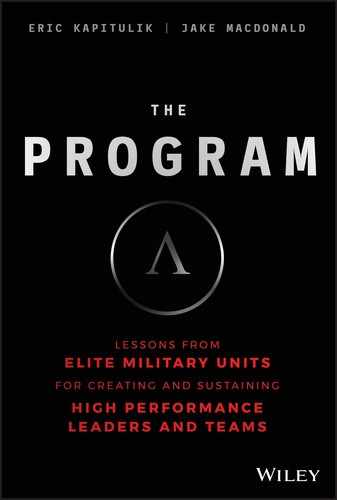57
I Don’t Have Enough Time
THE MOST COMMON excuse we hear is “I don’t have time.” There are 24 hours in day. Although we cannot change the amount of time that we have, we do choose our priorities and how we use those 24 hours to effectively address all of them. If we are saying that we don’t have time to do something, we are really saying that it is not a priority for us, and/or we didn’t prepare properly to accomplish it. Therefore, complaining that we don’t have time to do something is just an excuse. When we admit this to ourselves and to our teammates, we take ownership of it. If we own an issue, we have influence over it. Influence gives us control and control allows us to address and fix it. We cannot change the amount of time that we have. We can, however, change our priorities and how we use that time. We appreciate how busy so many readers of this book are. We are all on a lot of teams, and they all require an incredible amount of our energy and time. We also appreciate that we all have many different priorities based on a host of factors. We understand that returning a phone call, exercising, or spending meaningful time with friends and family are not the highest priorities for everyone. However, if you were to go to the gym at 4:30 a.m., for example, you would be surprised by how many people are already there working out. They are not all independently wealthy and single. They are parents and spouses. They have stressful, challenging jobs. They don’t have the time to work out. They make the time to do so because it is a priority for them. The person still in bed at that early hour and the one on the treadmill both have 24 hours in their day. Working out may be a priority for both of them. The latter just prepares differently to ensure that they will address that priority at some point during those 24 hours. This is true for any of the countless things that we want to do or must accomplish in our very busy days. This is true for any priority, regardless of its place on our list of them. We have the privilege of knowing, and working with, countless corporate employees from a hundred different industries. They have incredibly demanding schedules. However, in their 24-hour day, they exercise, call people back, file reports prior to deadlines, eat healthy, read, study, and spend time with their friends and families. They may not watch much TV, though. They don’t play video games or take long lunch breaks. Admittedly, they have very little idle time in their day, unless it is by design (such as personal reflection time), but they still accomplish all their priorities. They don’t have a different amount of time in their day than the rest of us; they just have different priorities and prepare accordingly to address all of them. When our instructors at The Program are working with teams, our schedule can be demanding, to say the least. An 18-hour workday or longer is not uncommon. A typical day during our busy season may look like this: We may repeat this process for a few events in a row: we leave one team and drive or fly straight to another. As you can see, there isn’t much time left in the day for working out. It would be easy for our teammates to make valid excuses about why they can’t stay fit. Instead, it is not unheard of for our teammates to wake up at 2 a.m. to work out before a 5 a.m. start with a team. A few years ago, Jamey Slife and another teammate were driving through the Northeast, going from event to event. Rather than take the time to find and go to a gym, they decided to pull over at a rest stop on the highway and work out. After a state trooper stopped Jamey while he ran shirtless in the breakdown lane of the highway, Jamey had the pleasure of explaining to the state trooper the priority we place on exercising as well as our belief in not making excuses. We are all on a lot of teams. As teammates and team leaders on them, we have countless priorities. Great teammates and great team leaders do not have the time to address all of them. We make the time to do so. Or we make excuses.
